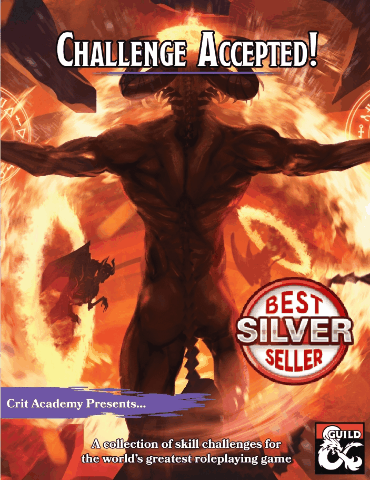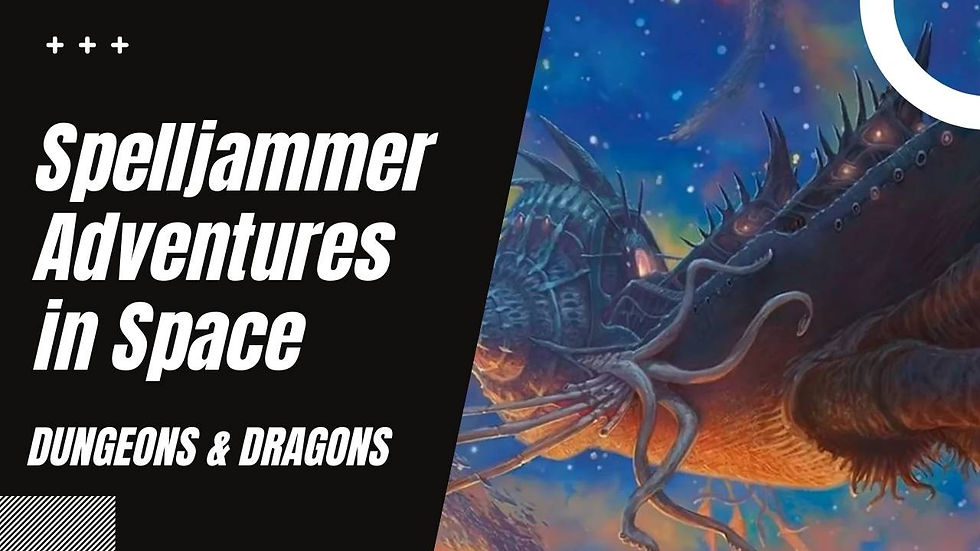Conveying Information to Players in Dungeons and Dragons
- Justin Handlin

- Apr 4, 2022
- 6 min read

Tips for Conveying Information to Players in Dungeons & Dragons
As Dungeon Master you’ve compiled a massive book full of NPCs, fantastic locations, complex monsters, and plenty of secrets, plots, and wonder. You’ve got pages chock full of details and planned out events, revelations, twists, turns and so much. You sit back from dozens of hours of preparation work on your Dungeons and Dragons campaign. A smile touches your face and you're happy with the result.
But, as you gaze over at the massive stack of notes and plans, it dawns on you slowly. How in the Nine Hells are you going to get ALL this information to your players? Well, don’t worry, cause we’ve got some powerful tips to help you convey all that amazing and important information from your notes, the players, and their characters.
Dungeon Master Exposition
When a campaign starts out, usually with a Session 0, the DM spends a significant portion of time setting the scene and the world in which the game is to take place. It’s the tool used to describe the details of the setting from a high level so that the players know what kind of world to expect. In most cases, a Dungeon Master will do this in advance. Usually tossing together a short document the players can read before the game even begins. For example, “Orcs hail from the Dragon’s Spine mountains. While they aren’t the wisest of the races, they are strong and honor-bound. They often find themselves at odds with the Human villages in the forests that lay at the base of the mountains. While they tend to have scraps here and there, in most cases as long as they keep to their areas they don’t bother each other too much. The Race Pact prevents an all-out battle between the six great races. Forged in magic by the elves and enforced by the dwarves keeps the great races in check. Though the pacts weave have been weakening. Without the strong backlash from the magic, the battles are getting more common.”
Now, the exposition doesn’t have to just come in large spurts at the beginning of a campaign. They can be sprinkled out throughout the story. This most often takes place as knowledge skill checks. For example, if the characters hear mention of the Tree of Life, the DM may call for a nature check in most circumstances and tell them directly the information they learned. Or, if an elf is in the party a check may not be necessary as the Tree of Life is closely tied to elven beliefs each learns growing up.
This is a great way to include the character's class, features, race, and backgrounds to validate their choices. Don’t be afraid to bend and break rules for knowledge checks to provide information to the characters they would reasonably know. This simple trick allows a sense of reward for the player's choices while allowing you as the DM to share those bits of knowledge. Use your judgment and find a balance that works for you and your table.
Never have a boring Monster or NPC Again!
Blow your Players away with fully fleshed Villains, Allies, and More!
Complete with stats, backstories, motives, and different ways to utilize them in your stories!
NPC Interaction
One of my favorite ways to pass on information is through characters interacting with Non-Player Characters (NPCs) in the world. This makes for rewarding and interesting conversation at the table. Since it's a direct interaction with the player’s characters we can spend a good chunk of conversation answering questions the characters have as a reason to share lore and details about the world. Whether they are speaking with a passing local or interrogating a monster, the opportunity for worldbuilding is huge. The best part…NPCs have their own thoughts and biases. Their information can be inaccurate, or wrong entirely. Depending on their motives, they may outright lie to the characters. Skills such as insight or spells like the zone of truth can help with trust. Which will happen because the characters are a distrusting lot. But just because someone is honest, doesn’t mean they are reliable. Rumors abound and they can twist and turn from mouth to mouth. What may start off as “The Queen of Zani was assassinated. Her advisor and her honor guard slew the assassin, but it was too late” can quickly become “The Queen of Zani was assassinated, they say she was slain by her honor guard being led by her Advisor.” The NPC may very well believe this information is trustworthy, but passing from mouth to mouth the story bends. Make sure to get the most out of this powerful tool for building your world.
Research and Information Gathering
In some cases, the characters may learn information through specific mechanics of the game. A great example of this is the Sage background. It comes with the Researcher feature. “When you attempt to learn or recall a piece of lore, if you do not know that information, you often know where and from whom you can obtain it.” or another example might be spells such as Legend Lore that just outwrite give the character a brief summary of the significant lore about the person, place or object they name. Let's make it clear, there is nothing wrong with using a feature like this to learn information, but it can sometimes be the least dynamic. Though, if you can combine it with one of the others such as NPC Interaction, then you still get the fun dynamic from it. This is perfectly ok as these are tools and resources at the character’s disposal.
This will happen and can catch you off guard. It’s important to monitor which features and spells the characters may have that can serve as a vehicle for accessing information. That way, you are as prepared as possible and won’t have to think quite as much as if you weren’t prepared. You can easily expand this into a more dynamic way of gathering information by requiring the information to be limited unless they take certain steps. An example would be that a wizard casts legend lore on a dagger to learn that it has a twin. They know about the dagger and that it has a twin, but not where the twin might be. A locate object spell may reveal it inside the Shadowfang’s thieves guild. Then a rogue with a criminal contact feature may be necessary to gain access to its location. So while we feed lore and details via these features, it still comes down to needing action to make it a more dynamic delve into the world.
Setting Clues
The world’s details are a perfect way to include opportunities to reveal information about the world around the characters. This is certainly a bit heavier-handed than interacting with a character but can be a great way to dole out the details.
In Dungeons and Dragons, the characters delve into all sorts of dungeons and extraordinary locations. It’s not surprising to find representations of major world events carved, painted, or engraved on walls, ceilings, and objects in the world. If the characters delve into a large pyramid that was hidden under the sand until recently. The decor likely tells a strong story of who built it, why it was here, and what it might contain. You can lean on these short scene-setter clues to help tell the lore of the world in the area that may not be common or even recorded knowledge.
Even ordinary objects can be used to expand your world. Finding a rare ceramic teacup could be a great way to delve into the trade between the rare seafolk and major ports. The seafolk specializes in these unique shiny ceramic vases, jars, bowls, cutlery, and other commonly used tools. This can open the discussion about the relationship between the human cities and seafolk beyond trading. Turns out, there is a treaty between the two that either can call upon one another’s aid in the time of war. The ceramic object trading is a constant reminder of that treaty.
In the end, as DM you can’t expect your players to remember every little detail of the magnificent world you’ve created. Likewise, you can’t assume they know anything about it unless you tell them. There is a maxim regarding all manner of writing that is “show don’t tell.” When it comes to your world, use the setting, NPCs, and encounters to show your world. If the villagers are afraid of the mist-coated swamp to the north, don’t just tell us that they are afraid. Include in their behavior, conversations, and even daily rituals. It’s more interesting for everyone at the table to discover and draw their own conclusions from the world presented to them. That being said, if the players themselves aren’t picking up your clues, just tell them. Otherwise, you can end up watching them get lost along the path.
If you enjoy this content, please consider checking out the rest of our articles in our blog here.
Thank you for reading our blog. If you enjoy the content and want to support us, visit our store or follow us on social media, join us on discord, youtube, and leave us a review.
Keep your blades sharp and spells prepared heroes!
*Crit Academy is an Affiliate of Amazon, DMsguild and DriveThruRPG*
















Comments